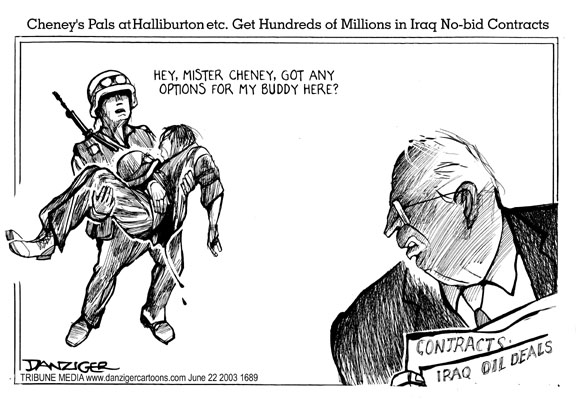http://www.countercurrents.org/shamoo240607.htm
24 June, 2007
Fpif.org
While the American people are seeking a way to bring the troops home from Iraq, the President and his administration are aiming to stay for much longer by redefining “victory” in Iraq once again—this time as a permanent occupier. Defense Secretary Robert Gates told reporters on June first this year that he favors a mutual agreement with Iraq in which “some force of Americans...is present for a protracted period of time....” Lt. Gen. Raymond Odierno, in charge of daily military operations in Iraq, supported this idea, comparing our involvement in Iraq to our continued military presence in South Korea. This type of “victory” was not what America signed up for as Bush led the nation to war. But even worse, this victory isn’t even realistic.

The cold-blooded realist, Henry Kissinger, told the Herald Tribune in April, “A military victory...is not possible.” The National Intelligence Estimate (NIE) of last February said for all practical purposes that defeat was inevitable.
(Photo: www.vvaw.org/.../
Even if Bush’s much touted surge of 30,000 troops helps temporarily, it will not work under a permanent occupation. A large nationalist, anti-occupation, peaceful movement exists in Iraq. The nationalists’ movement wants to free Iraq from the military occupation but under the right conditions they are ripe to cooperate with the United States to rebuild Iraq. There have been many demonstrations by hundreds of thousands of Iraqis asking for a peaceful solution. These Iraqi citizens are asking for what we promised—freedom and democracy—not 50 years of occupation. Unfortunately, the administration and the media has ignored this possibility, instead concentrating on the suicide-bombings and the al-Qaeda elements in Iraq.
Emerging from the mess in Iraq is another ominous message: “going long” might mean supporting the Shiites over all other ethnic groups in order to “win”. The conservative columnist Morton Kondracke (the executive editor of Roll Call, the Capital Hill newspaper) wrote in his May 15 column in the Examiner that we should “back Shiites” and “win dirty” with the implications of an ethnic cleansing of the Sunnis. Kondracke’s hope is that by supporting the moderate Shiite Maliki government, we will carry enough favor to keep them in check against Iranian interests.
Kondracke and those calling for permanent occupation as a solution are blind to what’s transpiring in Iraq today. Operations in Iraq have detained nearly 18,000 people since January. Over the course of this war Iraqis have suffered every indignity of war. Their homes have been invaded. There are kidnappings and murders. Four million Iraqis are refugees. Life for many Iraqis bears no resemblance to life before our invasion.
For more than four years, Iraqis have been punished for having a miserable despot as their leader—a circumstance far beyond the control of the average Iraqi. A long term occupation and backing one ethnic group will only continue these injustices.
Victory in Iraq should begin with a sovereign government in Baghdad. No military bases signifying occupation would exist, and diplomatic relations would be signified by a smaller scale embassy in Baghdad. Iraqi oil, belonging to the Iraqi people, would be contracted with anyone the Iraqis chose, as a sovereign nation negotiating the best deal for their country. While the American people can live with this outcome in clear conscience, it is doubtful that the Bush administration and the large contractors involved in Iraq will give up their victory without another war on our hands.
Adil E. Shamoo is a professor at the University of Maryland School of Medicine. He writes on ethics and public policy and can be reached at: ashamoo@umaryland.edu. Bonnie Bricker is a freelance writer.
Copyright © 2007, Institute for Policy Studies.





No comments:
Post a Comment